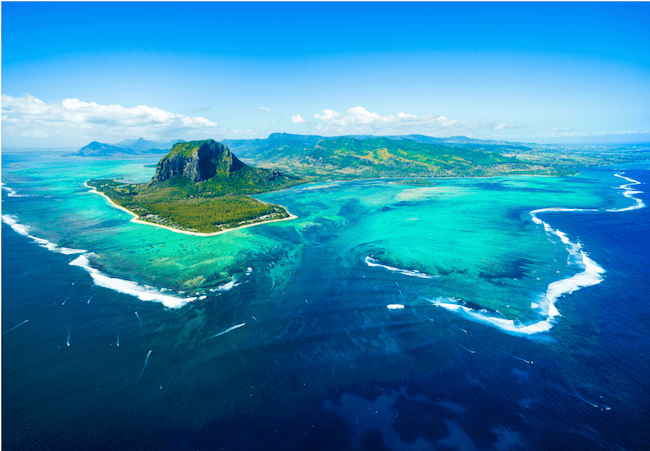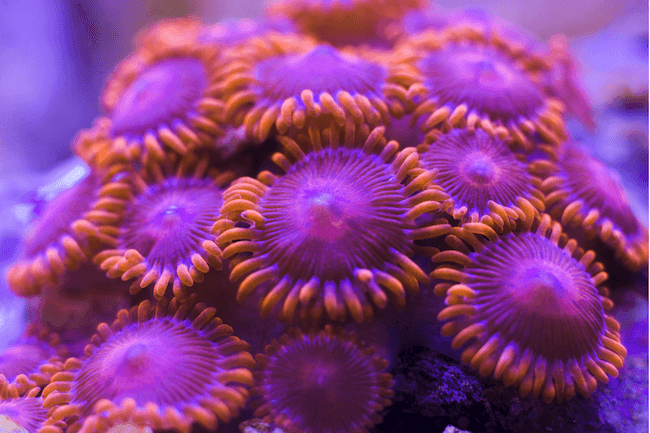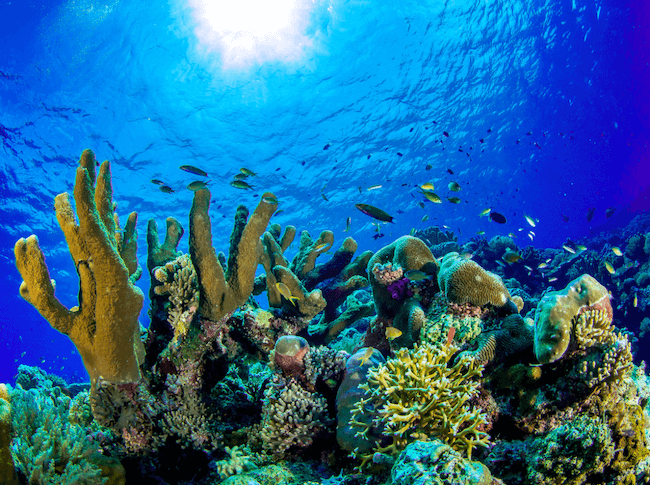Coral reefs are some of the most diverse ecosystems on the planet. Contrary to what many people assume, coral aren’t plants – they’re animals. A coral reef is composed of thousands of soft-bodied animals called coral polyps that collect layers of calcium carbonate over time. These environments attract a multitude of other plants and animals, including a vast variety of brightly colored tropical fish. Not only are these structures incredibly beautiful, but they are also crucial to the survival of life on Earth. In this article, you can discover ten more fun facts about coral reefs.
1. Coral reefs protect wildlife
‘Barrier’ reefs get their name because they protect shallow warm waters from the open sea. This protection creates an important habitat for many types of tropical fish and rare plants.
2. There are three different types of coral reef

Coral reefs can be divided into three types: fringing reefs, barrier reefs, and atolls. Fringing reefs are close to shore, whereas a barrier reef will lie further out to sea. Often, atolls will be mistaken for islands because they are so large and generally appear on the rim of a lagoon.
3. Coral needs sunlight to grow
Coral needs sunlight to grow, which is why they thrive in shallow water. As a result, you’re unlikely to find a coral reef deeper than 45 feet. Furthermore, they also tend to prefer tropical seas, as the sea water is warmer and clearer.
4. Large reefs are thousands of years old
Large, visible reefs like the Great Barrier Reef in Australia are between 5,000 and 10,000 years old. Over time, the Great Barrier Reef has grown to include 900 smaller reefs and cover 2,600 miles crossing 500 islands.
5. Coral reefs make the sea bed more stable
Coral reefs improve the structural integrity of the sea bed. This is because they encourage the growth of seagrasses and other sea plants. The more plant life there is on the sea bed, the better it is held together. This reduces the impact of storms and tidal surges, preventing the erosion of the shoreline.
6. They also clean the water
Coral reefs also promote better water quality. The plants, animals, and organisms act as a filter, trapping debris that makes the surrounding environment cleaner. Subsequently, coral reefs tend to grow larger in areas with stronger currents as the wave patterns deliver more nourishment to the ecosystem.
7. Reefs are important nesting grounds
The calm, warm waters around coral reefs mean they are an important mating habitat for fish and other sea creatures. These protected environments create a safe-haven for eggs, keeping them safe from predators. Furthermore, the abundance of seagrass makes coral reefs important nurseries for marine mammals like dugongs.
8. The algae on a coral reef is an animal

The algae that usually covers the surface of coral isn’t a plant, it’s a living organism. There are many different types of algae, from microscopic creatures to varieties with brightly-colored leaf-like tendrils. Furthermore, a microscopic variety of algae called Benthic Diatoms contribute a significant proportion to a reef’s dense biomass.
9. Coral reefs can treat cancer
Scientists have discovered that organisms within coral reefs can be used to treat cancer and other illnesses. For example, by studying coral reefs, scientists have been able to develop proteins that attack cancer cells.
10. Reefs can help to manage global warming
The last of our fun facts about coral reefs concerns their vital role in managing the planet’s carbon dioxide levels. As a giant, living, breathing organism, they are essential to regulating carbon dioxide levels in the ocean. Therefore, these ecosystems play an important role in managing the effects of global warming.
Enjoyed these fun facts about coral reefs? Find out how you can protect these precious ecosystems

Although coral reefs help to manage the effects of global warming, they are under serious threat as a result of rising carbon dioxide levels. Excessive carbon dioxide produced by burning fossil fuels is dissolving into the ocean, causing the acidity of the sea to rise. This process seriously damages coral reefs, destroying the habitats of thousands of fish, plants, and mammals. Therefore, it is critical that we do our bit to reduce our impact on the environment. If you liked these fun facts about coral reefs, you can get involved in protecting these precious environments. For more information, take a look at The Coral Reef Alliance website.
No comments yet
There are no comments on this post yet.






Leave a comment